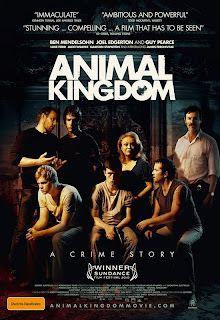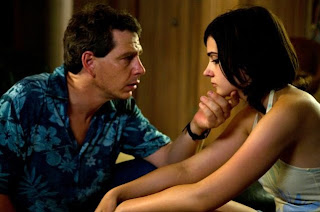(Because there's never a bad time or too tenuous an excuse to throw in a little reference to the great Saint-Saëns, hence the post title.)

There are plenty of films out there that center on crime—crime dramas, crime thrillers, even "crime epics." (A very good example of the last category would be last year's terrific two-part biopic Mesrine (trailer) starring Vincent Cassel, epically spanning decades and continents.) This is only natural; the tension and danger simply make for good storytelling, and the transgressiveness of it is exactly what most people would love to experience vicariously. The centerpieces of such films are usually the crimes themselves—the heists, the hits, etc. Rare is the crime movie that doesn't give the audience that adrenaline rush, that payoff, but instead focuses on the criminals when they're past their prime, when the main concern isn't the next score but simply staying out of prison or even staying alive. That's the kind of film Animal Kingdom (trailer) is, an outstanding little downer of a crime film from Australia that's one of the best films of last year.
The film centers around J (James Frecheville), a laconic (indeed, seemingly emotionless) seventeen-year-old boy whose mother OD's on heroin and is taken in by his grandmother and uncles, a band of notorious armed robbers. There's the hyperactive, drug-dealing Craig (Sullivan Stapleton), Darren (Luke Ford), barely older than J and not showing much stomach for the work, and their relatively level-headed friend and parter Baz (Joel Edgerton, very much reminding me of an Australian Prince Colwyn from Krull); rather than playing the "Ma Barker" role, J's grandmother Janine (Oscar-nominated Jacki Weaver), as J puts it, "just wanted to be where the boys were" (though her role changes as matters become more desperate). Rounding out the crew is J's third uncle, the volatile Andrew, called "Pope" (Ben Mendelsohn), who's been in hiding from the Melbourne Police's increasingly ruthless armed-robbery unit. We never really see them in action, but instead watch as growing police pressure causes them to push back as much as they can against the authorities and to lash out against one another.
All this is seen through the eyes of young J, whose initial position as an outsider with relation to his family makes him an ideal window through which the audience can be introduced to them and their way of life. As the story goes on, however, we see him transition from a Nick-Carraway-like passive observer to the story's principal mover.

Though he's been making short films for the past several years, Animal Kingdom is director David Michôd's first feature-length effort, and with that in mind it's extraordinary in its confidence, grace, and expert command of both narrative and performances. (In that respect, I'm reminded of another of the best directorial débuts of the last few years, Tom Ford's A Single Man, reviewed here.) Speaking of performances, while every one is solid, there are a few that particularly stand out for recognition: Frecheville's J, a shell-shocked young man trying just to get along amidst the growing danger in which he finds himself, before being forced to take matters into his own hands; Weaver's Janine, a seamless blend of motherly affection when she can afford it and ruthless determination when she can't; and Guy Pearce's understated performance as Sgt. Leckie, a police detective who's both determined to do his job the right way and is possibly the only person genuinely concerned about J's welfare.
However, a discussion of the film's performances would be incompete without mentioning Mendelsohn as Uncle Pope. He simply steals every scene he's in, with a pervasive air of menace that's a blend of brutal thuggishness and manipulative cunning. His bestial nature (pun intended) is only accentuated by Mendelsohn's almost simian appearance, with his slouched posture, sloping forehead, heavy brow, wide mouth, and weak chin. (I hate to sound like some nineteenth-century criminal phrenologist here—"You have the brainpan of a stagecoach tilter!"—but his looks really do add to how sinister and threatening his character seems.) In a film full of terrific performances, Mendelsohn is the acting MVP.
There's a particular scene—what I call "the 'All Out of Love' scene"—that not only showcases the best of Michôd's technique as a filmmaker in a film full of terrific cinematic craft, but also is guaranteed to change the way anyone who watches it feels about Air Supply's classic syrupy ballad. I don't want to give it away by describing it too much, but it's just such an incredibly effective marriage of photography, sound (both the song itself and the low, eerie hum playing over it), editing, and performance, with Uncle Pope at his most terrifying without needing to do more than just sit and stare. It's easily one of last year's most arresting, effective examples of filmmaking technique to be found in a single scene, alongside the crew race from The Social Network (showy, yes; superfluous, no), the dream-dance that begins Black Swan, Aron's severing his arm in 127 Hours, or any one of the food-preparation or -consumption scenes in the foodie porn flick that is I Am Love. (Admittedly, 2010 wasn't a great year, but there were a few memorable moments.)

As a matter of fact, the "All Out of Love" scene reminded me simultaneously of the work of not one but two of the greatest living filmmakers, Scorsese and Lynch. Scorsese is known for his visionary use of popular music, from "Layla" in Goodfellas to "Be My Baby" and "Please Mr. Postman" in Mean Streets, all the way back to the eponymous song in his under-seen début, Who's That Knocking at My Door. Though I'd hesitate to call it Scorsesian, the use of pop music in Animal Kingdom certainly is imaginative and effective, from the aforementioned Air Supply to Jimmy Cliff's "Sitting in Limbo" playing as the family leasurely walks down the sidewalk before being abruptly cut off as the film cuts to the next scene. As for Lynch, Michôd often creates a haunting, threatening, dreamlike atmosphere that could be straight out of Blue Velvet, Lost Highway, or Mulholland Drive; he does this using slow, steady, elegant camerawork, careful use of focus, and a low, ominous soundtrack that gives a great sense of the tension and fear in which J and the others live. While Michôd's obviously not the first to use such filmmaking tools, it's clear that he knows how to use them well, as that scene perfectly demonstrates.
Though Animal Kingdom certainly qualifies as a "crime thriller," someone expecting it to follow the more standard narrative course of that genre will be disappointed (or pleasantly surprised, one would hope). This is no Heat, no The Town. It takes the focus off of the thrilling, fast-paced, often glamorous crimes themselves and puts it on the consequences, as they start to catch up with our "heroes" and push them to do worse, more desperate things to those closest to them. And this story is told with more grace, passion, and tension through its whole running time than most films manage for a scene at a time. If Animal Kingdom is any indication, we can expect David Michôd to become one of the great new directors of the years to come.
(And as a reward for reading this far, here is the sublime "The Swan," from Saint-Saëns's "The Carnival of the Animals," performed by Yo-Yo Ma. Enjoy, you earned it.)
No comments:
Post a Comment